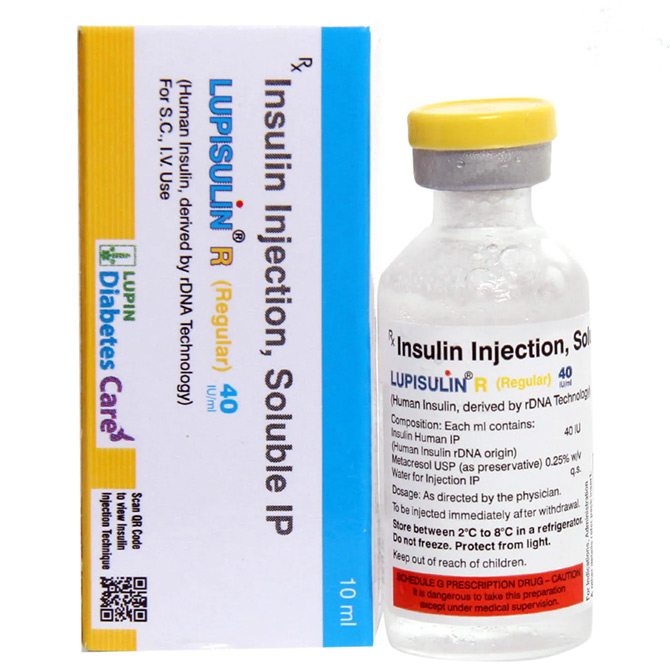🔹 Insulin (Soluble) Injection 40 IU/mL – As Licensed
📄 **Description:
Soluble insulin**, also known as regular insulin, is a short-acting human insulin preparation used to control blood sugar levels in individuals with diabetes mellitus. It is administered subcutaneously or intravenously and begins acting within 30 minutes.
💊 Prescription / Use:
- Indications:
- Type 1 Diabetes Mellitus (insulin-dependent)
- Type 2 Diabetes Mellitus when oral drugs are insufficient
- Gestational diabetes
- Diabetic ketoacidosis (IV use)
- Perioperative glycemic control
- Strength/Dosage Form:
- Injection: 40 IU/mL (also available in 100 IU/mL)
- Usually in 10 mL vials (400 IU total per vial)
- Route of Administration:
- Subcutaneous (SC): Preferred for routine use
- Intravenous (IV): In emergencies like DKA
- Intramuscular (rarely used)
- Prescription Drug: Schedule H
🔬 Nature:
- Short-acting recombinant human insulin
- Onset: 30 minutes
- Peak: 2–4 hours
- Duration: 6–8 hours
- Clear solution unlike cloudy intermediate/long-acting insulins
🌟 Advantages:
- Reliable glycemic control in acute situations
- Suitable for emergency use (IV route)
- Can be mixed with intermediate/long-acting insulins
- Compatible with sliding scale insulin therapy
- Cost-effective and widely available
📦 Common Packaging:
- 10 mL glass vial (with rubber stopper and aluminum seal)
- Labeled with:
- Insulin type (Soluble Human Insulin)
- Concentration (40 IU/mL)
- Batch number, Mfg/Exp dates, storage conditions
- Color-coded cap (usually red or orange for regular insulin)
🧊 Storage:
- Store between 2°C – 8°C (refrigerator)
- Do not freeze
- After opening: can be kept at room temperature (up to 25°C) for 28 days
- Protect from direct sunlight and heat
⚠️ Precautions:
- Monitor blood glucose levels frequently
- Adjust dose during illness, surgery, or stress
- Rotate injection sites to avoid lipodystrophy
- Watch for hypoglycemia (most common adverse effect)
- Do not share needles or vials
- In IV use: dilute appropriately and monitor potassium levels
👩⚕️ Patient Advice:
- Inject 30 minutes before meals
- Learn proper injection technique (usually on thigh, abdomen, or upper arm)
- Always carry sugar/candy in case of hypoglycemia:
- Signs: shakiness, sweating, dizziness, confusion
- Maintain a daily blood sugar log
- Never skip meals after injecting insulin
- Dispose of syringes/needles safely (in sharps container)
- Store insulin properly — do not use if solution becomes cloudy or discolored

